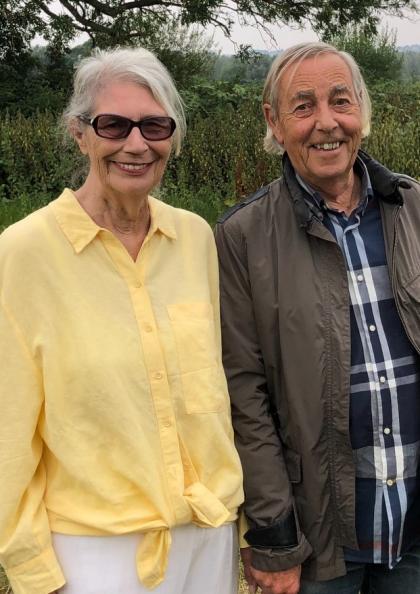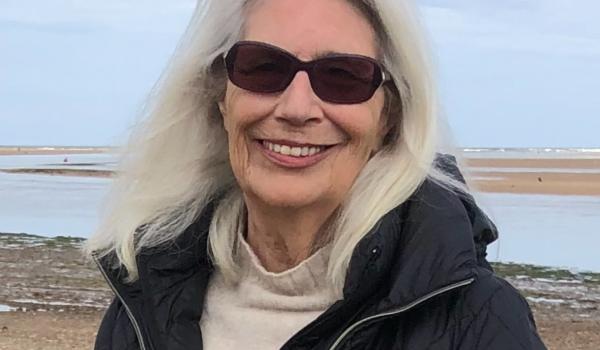Sometimes I’m frustrated. I'm now on my fourth recurrence of ovarian cancer and am also living with lymphoedema, a symptomatic disease, which is incredibly uncomfortable.
When I have a really bad day, I look at a miniature pink pom pom I have on a shelf. This pom pom makes me smile as it makes me think of a friend whom I met through the Ovarian Cancer Community. She related to me when I said I was having a day bad – she said she calls them pom pom days…it stands for Poor Old Me days.
Talking about cancer
Cancer is always there, in the back of my mind. I think of it daily – whether that’s looking into the garden, cooking a meal or just talking to someone. It’s always there and is something you can’t get away from.
I would advise anyone to speak about how you’re feeling and what you’re experiencing. Since my initial diagnosis in 2016 I've found that talking to people who are in a similar situation has really helped me. In fact, every Friday I join a group and for two hours – we share our stories, experiences and how we’re feeling. I dislike missing it as it means so much to me.
Talking is my hobby! Alongside speaking to people affected by ovarian cancer and lymphoedema, talking to friends is a great help too. Chatting about each other’s lives as we used to, sharing memories and laughing. It’s not just one way – it’s sharing their lives too – and knowing there are areas that are relatable.

My diagnosis
Seven years ago, I was in holiday in Australia when I had severe constipation and bloating. I didn’t think much of it and went to the pharmacy and was given laxatives. A couple of months later, nothing had improved so I had what was to be the first of 10 visits to the doctors over 11 months discussing my symptoms – bloating, abdominal pain, feeling full and needing to wee more urgently. I was given more laxatives, and even told that I might have IBS – something very rarely diagnosed in the 50+.
I went every month until November when I was referred for an ultrasound. From then it started.
After the ultrasound I was taken for a CA125 blood test. The results came back as 22, which wasn’t a high count as anything under 35 is normal. However, I later found out I did have ovarian cancer and it was advanced.
I was diagnosed with high grade serous ovarian cancer stage III. The consultant said, ‘you have incurable ovarian cancer and you’ll be on palliative care until you die’.
Within a few weeks, I had surgery and six rounds of chemotherapy which was followed by another six rounds later that year. Since my diagnosis I've undergone 19 CT scans, two Pet scans, four ultrasounds, three blood transfusions, three mammograms, five biopsies and one sigmoidoscopy! I've had times where I've felt great – one time being when I was on the PARP inhibitor Niraparib for two and a half years – and times I've felt so weak I needed help to walk.
Where I am now
After my last course of radiotherapy, I decided that I'd go for quality of life over quantity. I have an amazing boyfriend who is incredibly supportive and has been with me since the start of my diagnosis, and wonderful children and grandchildren with whom I want to spend as much time as possible. I feel lucky to have them.
My focus is now on lymphoedema and lobbying my local MPs and healthcare providers to give better access to care and treatment to lymphoedema sufferers. There’s more that can be done to help people like me.
Advice
For anyone who is newly diagnosed, with ovarian cancer or lymphoedema, the advice I'd give is to ask questions. Ask questions all the time. If you don’t understand anything, just ask. Take someone to your meetings as you’re not going to hear everything. Don’t be afraid to ring your consultant’s secretary. Research what’s happening using reliable sites. If you read a word you don’t understand – look it up.
You need to really understand what it is you’re being told, and the meaning behind all the information. Having a diagnosis of cancer is a traumatic event – don’t be afraid to ask what you can do to prolong your quality of life.
Spread the word
And lastly, if you can, spread the word about ovarian cancer. Many people mistakenly think a smear test will detect ovarian cancer, it won’t, and people don’t know the symptoms to look out for. I write to my MP often, and make displays in my local GPs and shops to try to raise awareness.
If I ever speak to anyone new, I'll always mention ovarian cancer because it doesn’t feel known. Although more people talk about cancer now, they don’t know about cancer.
Most of us now know about the symptoms of breast cancer, but we don’t know the symptoms of ovarian cancer. We need to get it out there, help people to understand the disease as this might mean people receive an earlier diagnosis.
If you’ve been affected by this story and would like to speak to a specialist nurse, you can call our dedicated support line on 020 7923 5475 or contact us: [email protected]. We're open from 9am until 5.30pm, Monday to Friday.
If reading this story has helped you, join the Ovarian Cancer Community to connect with more people affected by ovarian cancer: www.targetovariancancer.org.uk/onlinecommunity



